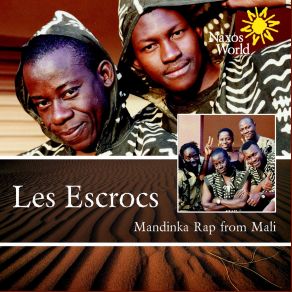Mandinka Rap from Mali
Download links and information about Mandinka Rap from Mali by Les Escrocs. This album was released in 2005 and it belongs to Hip Hop/R&B, Rap, World Music, Pop genres. It contains 14 tracks with total duration of 01:14:02 minutes.

|
|
|---|---|
| Artist: | Les Escrocs |
| Release date: | 2005 |
| Genre: | Hip Hop/R&B, Rap, World Music, Pop |
| Tracks: | 14 |
| Duration: | 01:14:02 |
| Buy it NOW at: | |
| Buy on iTunes $7.99 | |
Tracks
[Edit]| No. | Title | Length |
|---|---|---|
| 1. | Pirates | 4:55 |
| 2. | Saara | 4:20 |
| 3. | Enseignants | 5:09 |
| 4. | Tounga | 4:24 |
| 5. | Sida 2001 | 5:50 |
| 6. | Sida 2000 | 5:54 |
| 7. | Demisenw | 5:40 |
| 8. | Kokadje | 5:17 |
| 9. | Farafina Mussow | 5:12 |
| 10. | Integration africaine | 5:36 |
| 11. | CAN 2002 | 5:29 |
| 12. | Expulses | 5:14 |
| 13. | Kalan | 5:40 |
| 14. | Konotie magni | 5:22 |
Details
[Edit]No one who is familiar with both African and American pop music will be surprised to learn that what passes for hip-hop in Mali might not be recognized as such in the South Bronx. That's not to say that it isn't funky, or that there isn't a lot of clever wordplay, or that the music isn't topical. In fact, Les Escrocs do a demonstrably better job of addressing issues in their music than the vast majority of current American hip-hop artists do — songs on this album address everything from polygamy and AIDS to political corruption and feminism. But in strictly musical terms, the most significant difference between the music of Les Escrocs and just about any American hip-hop artist lies in the realm of hardness: this music doesn't have any. Look at the cover photo and you'll notice something weird — rappers Salim Diallo and Mamadou Tounkara are smiling. They're not trying to present themselves as pimps or hard cases. No bling, no SUVs, no pimp canes, no scantily clad women — just a handful of guys (plus one female singer) in casual dress expressing themselves to the accompaniment of mostly acoustic instruments, with the occasional electronic beat thrown in for flavor. Of course, that laid-back aesthetic means that things aren't always as compelling as they might be, but on highlight tracks like "Kalan" and "Konotié Magni," the balance between traditional and modern sounds yields something very close to magic. Recommended.